人教版(2019)必修第三册Unit4 Space Exploration Listening and speaking 课件(共21张PPT,内嵌音频)
文档属性
| 名称 | 人教版(2019)必修第三册Unit4 Space Exploration Listening and speaking 课件(共21张PPT,内嵌音频) |
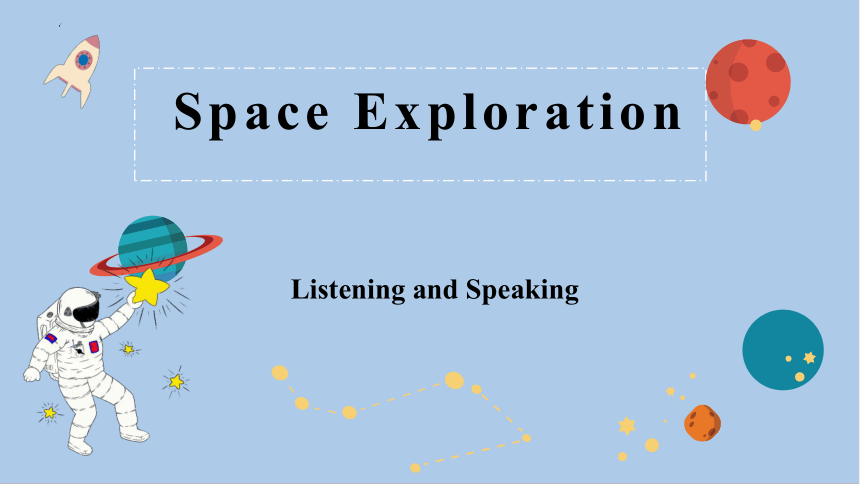
|
|
| 格式 | pptx | ||
| 文件大小 | 37.9MB | ||
| 资源类型 | 教案 | ||
| 版本资源 | 人教版(2019) | ||
| 科目 | 英语 | ||
| 更新时间 | 2024-09-06 20:33:35 | ||
图片预览



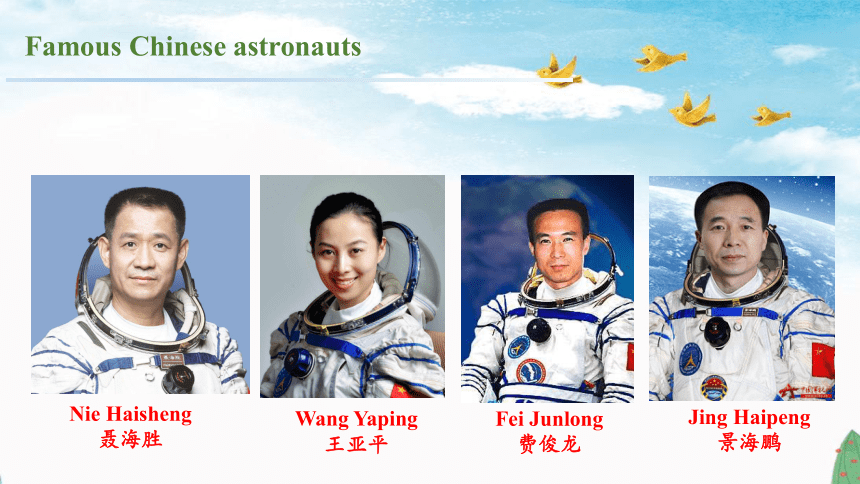

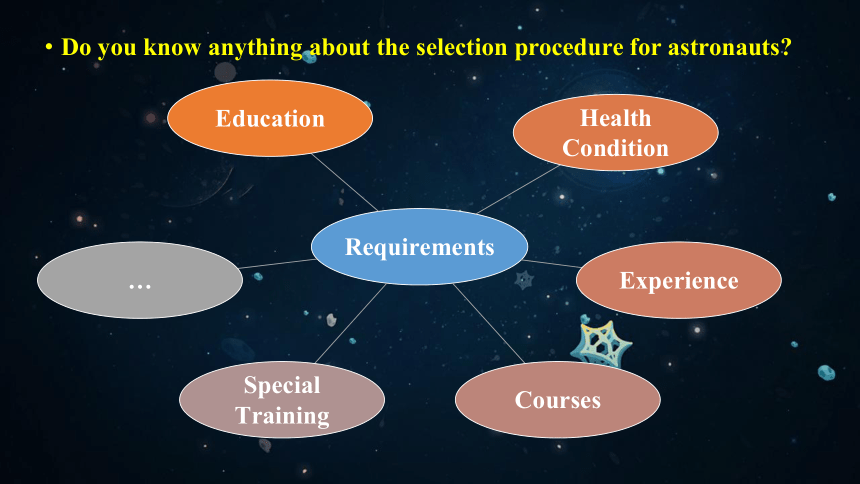
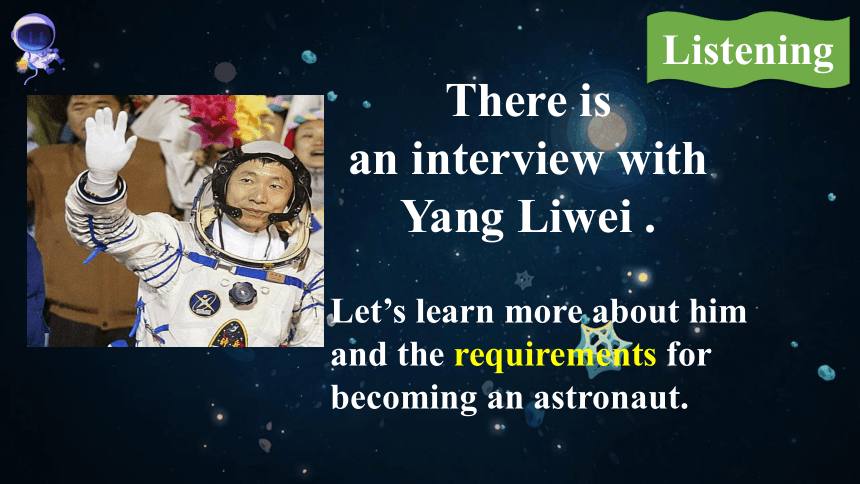
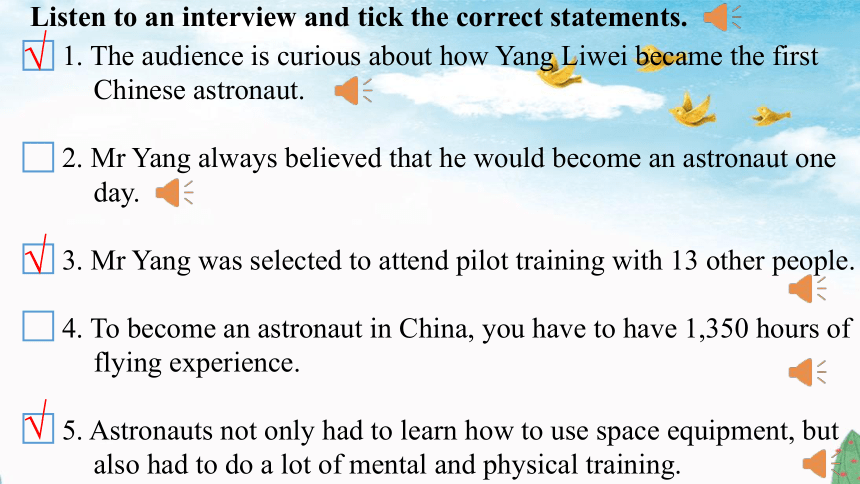
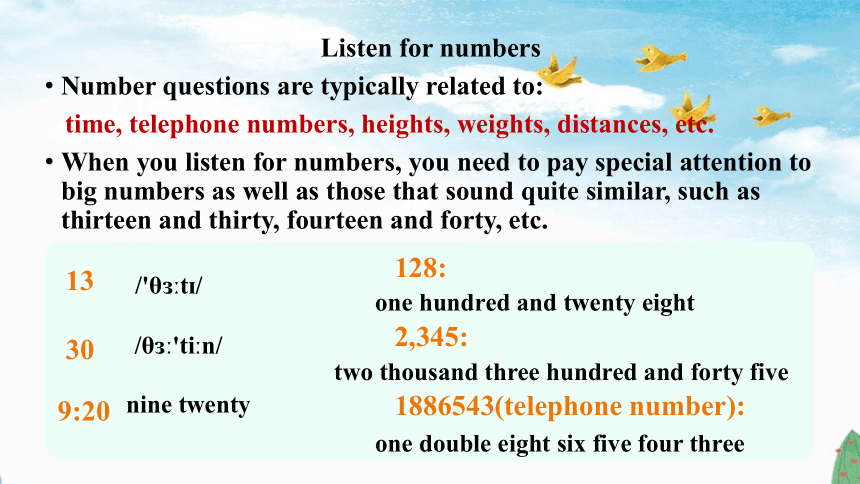
文档简介
(共21张PPT)
Space Exploration
Listening and Speaking
Lead-in
Mystery creates wonder and wonder is the basis of man’s desire to understand.
--- Neil Armstrong
神秘感激发好奇心,而好奇心则是人们探索未知事物的前提。
One small step for man, one
giant leap for mankind.
这是我个人的一小步,但却是整个人类的一大步。
The first man to go into space: Yuri Gagarin, Soviet Union, in 1961.
The first man to land on the moon: Neil Armstrong, America, in 1967.
The first Chinese person to go into space: Yang Liwei, in 2003.
The first Chinese female astronaut: Liu Yang, in 2012.
1. Can you name any famous astronauts from China or abroad
Famous Chinese astronauts
Nie Haisheng
聂海胜
Wang Yaping
王亚平
Fei Junlong
费俊龙
Jing Haipeng
景海鹏
What do you think of their job
Do you want to be an astronaut?
NOT everyone can become an astronaut.
Do you know anything about the selection procedure for astronauts
There is
an interview with Yang Liwei .
Let’s learn more about him and the requirements for becoming an astronaut.
Listening
Listen to an interview and tick the correct statements.
1. The audience is curious about how Yang Liwei became the first Chinese astronaut.
2. Mr Yang always believed that he would become an astronaut one day.
3. Mr Yang was selected to attend pilot training with 13 other people.
4. To become an astronaut in China, you have to have 1,350 hours of flying experience.
5. Astronauts not only had to learn how to use space equipment, but also had to do a lot of mental and physical training.
√
√
√
Listen for numbers
Number questions are typically related to:
time, telephone numbers, heights, weights, distances, etc.
When you listen for numbers, you need to pay special attention to big numbers as well as those that sound quite similar, such as thirteen and thirty, fourteen and forty, etc.
13
30
128:
2,345:
1886543(telephone number):
/'θ t /
/θ 'ti n/
two thousand three hundred and forty five
one hundred and twenty eight
one double eight six five four three
9:20
nine twenty
Listen for numbers
1. Yang Liwei graduated from college at the age of _____.
2. Before he joined China’s space programme, Mr Yang trained as a fighter pilot for ____years.
3. Mr Yang was one of the ____ pilots who were chosen to train for space flights.
4. At the time when Mr Yang entered the space programme, astronauts had to be shorter than _____cm in height and less than ____kg in weight.
5. Mr Yang became China’s first astronaut when he was ____ years old.
22
10
14
70
172
38
Listen for the requirements for an astronaut
Education background: __________ degree, trained to be _____________
Experience: ______ hours of ___________ experience
Health condition: must be in perfect ___________________
Courses: __________, ___________and____________
Special training: Practice using___________________, and do a lot of ______________________training
astronomy
science
English
health and shape
flight
space equipment
mental and physical
1350
a fighter pilot
College
Interviewer:Today we are very pleased to chat with Mr Yang Liwei, the first Chinese astronaut. Welcome to the show, Mr Yang.
Mr Yang:Thank you.
Interviewer:Mr Yang, our audience is very curious about how you succeeded in becoming China’s first astronaut. It must have been a very difficult thing to achieve. Did you always want to be an astronaut
Mr Yang:Yes, I dreamt of it when I was young, but I never thought my wish would come true. It took a long time. First, I got my college degree when I was 22, and then I worked as a fighter pilot for around 10 years. I finally became China’s first astronaut when I was 38 years old.
Interviewer:Oh, so you must be a really ecperienced pilot. Do you think that was one of the reasons why you were chosen for space pragramme
Mr Yang: Sure. I had 1350 hours of flight experience, which I think really helped me.
Interviewer:So how difficult was it to join the space programme
Mr Yang:There was a lot of competition. Altogether, 14 of us were chosen from among 1, 500 pilots to train for space flights.
Interviewer:That sounds really difficult. Did you also have to be a certain size and weight
Mr Yang:Yes, at the time, you had to be shorter than 172 centimetres in height and weigh less than 70 kilograms. You also had to be in perfect health and perfect shape.
Interviewer:So you were the perfect choice! As we all know, an astronaut needs to be healthy and calm in order to work in space. But you also had to study a lot, too, right
Mr Yang:Yes, I had to learn English, science, and astronomy. I also had to practise using space equipment, and do a lot of mental and physical training. It was very tiring, but I was so proud to have the opportunity.
Training for an astronaut
Think about the following questions and share your opinions with partners.
1. What do you think of being an astronaut
2. Do you want to be an astronaut in the future Why or why not
Discussion
Share your idea!
EXAMPLE:
A: What do you think of being an astronaut
B: I think being an astronaut would be cool.
A: So do you want to be an astronaut in the future
B: Of course. I am so curious about the living creatures in space that I hope to be an astronaut one day to observe them. How about you Would you like to be an astronaut
A: I’m not sure, but I think it might be too difficult for me. There are so many requirements.
Test for goals
Max is interviewing Captain Brown about his life in space.
Listen to the interview and answer the questions.(p43)
1. What did Captain Brown usually wear inside the station
2. How did he prepare his food in space
3. How did he keep himself clean in space
4. How did he spend most of his time in space
5. What did he do during his free time
6. What did he look forward to most during his stay in space
The food was__________ and ____________for him.
He just had to _____________ and __________it.
He used a ____________ to wash.
prepared
stored
heat the food
enjoyed
soapy towel
He wore____________ and____________.
shorts
T-shirts
He played the __________ and __________.
He was often busy doing___________________.
He looked forward to having with _____________ most.
different experiments
guitar
chess
a weekly video call
his family
Interviewer: Hello, Captain Brown. You’re back on Earth now. Are you happy to be back
Captain Brown:Well, yes and no. It’s great to see my family again, but I also miss the International Space Station. I’ve gotten used to floating around just wearing shorts and a T-shirt.
Interviewer: So let me ask about the space station. Was eating in space difficult
Captain Brown: Not really. We don’t have to cook in space. We choose what we want to eat before we go to space, and then the food is prepared and stored for us. We just have to heat the food and enjoy it.
Interviewer: Cool. Well, I know astronauts cannot shower in space since the water would float away, so I’d love to know how you keep yourselves clean.
Captain Brown:Oh, we use a soapy towel to wash. And we brush our teeth the same way as we do on Earth. But astronauts usually swallow their toothpaste.
Interviewer: Gosh, I hope it tasted good! So how long did you stay in space during your last mission
Captain Brown: I was there for more than five months.
Interviewer: Wow! So what kind of work did you do up there
Captain Brown: I was usually busy doing different experiments.
Interviewer: Did you have any free time Do astronauts get time off
Captain Brown: Yes. When I was free, I played the guitar. That’s right—I took my guitar with me. I also played chess. My favorite thing to do, though, was to have my weekly video call with my family.
Assignments
《同步导学案》p81, 1, 2, 3.
Thanks
Space Exploration
Listening and Speaking
Lead-in
Mystery creates wonder and wonder is the basis of man’s desire to understand.
--- Neil Armstrong
神秘感激发好奇心,而好奇心则是人们探索未知事物的前提。
One small step for man, one
giant leap for mankind.
这是我个人的一小步,但却是整个人类的一大步。
The first man to go into space: Yuri Gagarin, Soviet Union, in 1961.
The first man to land on the moon: Neil Armstrong, America, in 1967.
The first Chinese person to go into space: Yang Liwei, in 2003.
The first Chinese female astronaut: Liu Yang, in 2012.
1. Can you name any famous astronauts from China or abroad
Famous Chinese astronauts
Nie Haisheng
聂海胜
Wang Yaping
王亚平
Fei Junlong
费俊龙
Jing Haipeng
景海鹏
What do you think of their job
Do you want to be an astronaut?
NOT everyone can become an astronaut.
Do you know anything about the selection procedure for astronauts
There is
an interview with Yang Liwei .
Let’s learn more about him and the requirements for becoming an astronaut.
Listening
Listen to an interview and tick the correct statements.
1. The audience is curious about how Yang Liwei became the first Chinese astronaut.
2. Mr Yang always believed that he would become an astronaut one day.
3. Mr Yang was selected to attend pilot training with 13 other people.
4. To become an astronaut in China, you have to have 1,350 hours of flying experience.
5. Astronauts not only had to learn how to use space equipment, but also had to do a lot of mental and physical training.
√
√
√
Listen for numbers
Number questions are typically related to:
time, telephone numbers, heights, weights, distances, etc.
When you listen for numbers, you need to pay special attention to big numbers as well as those that sound quite similar, such as thirteen and thirty, fourteen and forty, etc.
13
30
128:
2,345:
1886543(telephone number):
/'θ t /
/θ 'ti n/
two thousand three hundred and forty five
one hundred and twenty eight
one double eight six five four three
9:20
nine twenty
Listen for numbers
1. Yang Liwei graduated from college at the age of _____.
2. Before he joined China’s space programme, Mr Yang trained as a fighter pilot for ____years.
3. Mr Yang was one of the ____ pilots who were chosen to train for space flights.
4. At the time when Mr Yang entered the space programme, astronauts had to be shorter than _____cm in height and less than ____kg in weight.
5. Mr Yang became China’s first astronaut when he was ____ years old.
22
10
14
70
172
38
Listen for the requirements for an astronaut
Education background: __________ degree, trained to be _____________
Experience: ______ hours of ___________ experience
Health condition: must be in perfect ___________________
Courses: __________, ___________and____________
Special training: Practice using___________________, and do a lot of ______________________training
astronomy
science
English
health and shape
flight
space equipment
mental and physical
1350
a fighter pilot
College
Interviewer:Today we are very pleased to chat with Mr Yang Liwei, the first Chinese astronaut. Welcome to the show, Mr Yang.
Mr Yang:Thank you.
Interviewer:Mr Yang, our audience is very curious about how you succeeded in becoming China’s first astronaut. It must have been a very difficult thing to achieve. Did you always want to be an astronaut
Mr Yang:Yes, I dreamt of it when I was young, but I never thought my wish would come true. It took a long time. First, I got my college degree when I was 22, and then I worked as a fighter pilot for around 10 years. I finally became China’s first astronaut when I was 38 years old.
Interviewer:Oh, so you must be a really ecperienced pilot. Do you think that was one of the reasons why you were chosen for space pragramme
Mr Yang: Sure. I had 1350 hours of flight experience, which I think really helped me.
Interviewer:So how difficult was it to join the space programme
Mr Yang:There was a lot of competition. Altogether, 14 of us were chosen from among 1, 500 pilots to train for space flights.
Interviewer:That sounds really difficult. Did you also have to be a certain size and weight
Mr Yang:Yes, at the time, you had to be shorter than 172 centimetres in height and weigh less than 70 kilograms. You also had to be in perfect health and perfect shape.
Interviewer:So you were the perfect choice! As we all know, an astronaut needs to be healthy and calm in order to work in space. But you also had to study a lot, too, right
Mr Yang:Yes, I had to learn English, science, and astronomy. I also had to practise using space equipment, and do a lot of mental and physical training. It was very tiring, but I was so proud to have the opportunity.
Training for an astronaut
Think about the following questions and share your opinions with partners.
1. What do you think of being an astronaut
2. Do you want to be an astronaut in the future Why or why not
Discussion
Share your idea!
EXAMPLE:
A: What do you think of being an astronaut
B: I think being an astronaut would be cool.
A: So do you want to be an astronaut in the future
B: Of course. I am so curious about the living creatures in space that I hope to be an astronaut one day to observe them. How about you Would you like to be an astronaut
A: I’m not sure, but I think it might be too difficult for me. There are so many requirements.
Test for goals
Max is interviewing Captain Brown about his life in space.
Listen to the interview and answer the questions.(p43)
1. What did Captain Brown usually wear inside the station
2. How did he prepare his food in space
3. How did he keep himself clean in space
4. How did he spend most of his time in space
5. What did he do during his free time
6. What did he look forward to most during his stay in space
The food was__________ and ____________for him.
He just had to _____________ and __________it.
He used a ____________ to wash.
prepared
stored
heat the food
enjoyed
soapy towel
He wore____________ and____________.
shorts
T-shirts
He played the __________ and __________.
He was often busy doing___________________.
He looked forward to having with _____________ most.
different experiments
guitar
chess
a weekly video call
his family
Interviewer: Hello, Captain Brown. You’re back on Earth now. Are you happy to be back
Captain Brown:Well, yes and no. It’s great to see my family again, but I also miss the International Space Station. I’ve gotten used to floating around just wearing shorts and a T-shirt.
Interviewer: So let me ask about the space station. Was eating in space difficult
Captain Brown: Not really. We don’t have to cook in space. We choose what we want to eat before we go to space, and then the food is prepared and stored for us. We just have to heat the food and enjoy it.
Interviewer: Cool. Well, I know astronauts cannot shower in space since the water would float away, so I’d love to know how you keep yourselves clean.
Captain Brown:Oh, we use a soapy towel to wash. And we brush our teeth the same way as we do on Earth. But astronauts usually swallow their toothpaste.
Interviewer: Gosh, I hope it tasted good! So how long did you stay in space during your last mission
Captain Brown: I was there for more than five months.
Interviewer: Wow! So what kind of work did you do up there
Captain Brown: I was usually busy doing different experiments.
Interviewer: Did you have any free time Do astronauts get time off
Captain Brown: Yes. When I was free, I played the guitar. That’s right—I took my guitar with me. I also played chess. My favorite thing to do, though, was to have my weekly video call with my family.
Assignments
《同步导学案》p81, 1, 2, 3.
Thanks
